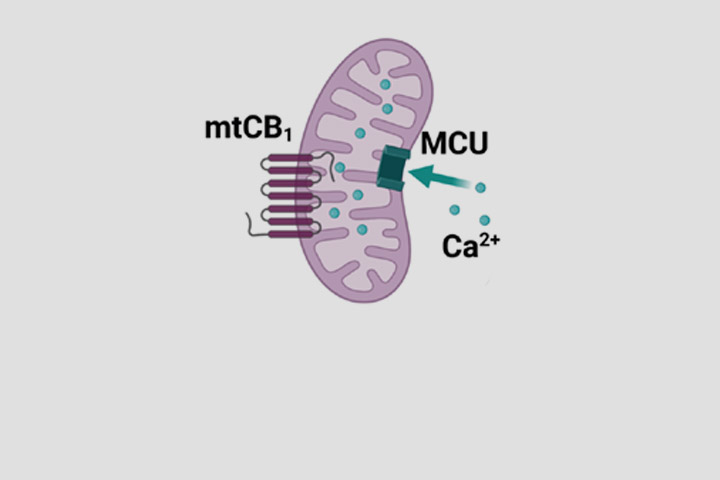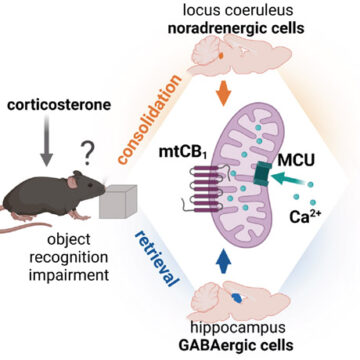
Together to forget: mitochondrial cannabinoid receptors are responsible for stress hormones-induced memory impairment.
 Stressful situations can affect how memories are stored in our brain. As our bodies perceive stress, adrenal glands make and release the hormone cortisol, which triggers many complex processes aiming to adapt and react appropriately. One of these responses is selective amnesia, likely responding to the need of focusing the mnemonic energies on the source of stress rather than on unrelated events. However, the mechanisms underlying such selective actions were scantly known. In their study published online on 24 of April 2023 in Neuron, the Marsicano group at the Neurocentre Magendie revealed that the injection of corticosterone (the rodent equivalent of cortisol) impairs different stages of memory, and show that cannabinoid receptors CB1 found in mitochondria are crucial for this impairment.
Stressful situations can affect how memories are stored in our brain. As our bodies perceive stress, adrenal glands make and release the hormone cortisol, which triggers many complex processes aiming to adapt and react appropriately. One of these responses is selective amnesia, likely responding to the need of focusing the mnemonic energies on the source of stress rather than on unrelated events. However, the mechanisms underlying such selective actions were scantly known. In their study published online on 24 of April 2023 in Neuron, the Marsicano group at the Neurocentre Magendie revealed that the injection of corticosterone (the rodent equivalent of cortisol) impairs different stages of memory, and show that cannabinoid receptors CB1 found in mitochondria are crucial for this impairment.
First, the authors showed that the injection of the stress hormone corticosterone impairs mice ability to recognize previously presented object during 2 different phases of memory processing: consolidation, when acquired information are stored in brain circuits, and retrieval, when already stored memories are accessed to be used. Interestingly, the authors found that mitochondrial CB1 receptors are necessary for the impairing effect of corticosterone, but in different cell-types and brain regions for each memory process. Thus, impairment of consolidation is mediated by mitochondrial CB1 receptors in noradrenergic cells originating from locus coeruleus, and impairment of retrieval is mediated by mitochondrial CB1 receptors in GABAergic neurons of the hippocampus.
Next, the researchers wanted to define the mechanism of this impairment. It is well known that cannabis use can cause memory problems in both humans and mice. It was previously shown that the memory impairment caused by injection of cannabinoids relies on changes in mitochondrial respiration. However, it does not seem to be the case for impairment of memory induced by stress hormone. The authors found instead that it relies on regulation of mitochondrial calcium dynamics. This striking discovery shows for the first time that exogenous cannabinoids and endogenous cannabinoids, which are produced in our bodies, might act through different mechanisms in the brain.
These results might not only help develop better strategies to deal with stress-related disorders that affect our memory, but also point out that there is a potentially important difference between the action of “exocannabinoids” and “endocannabinoids” in the brain, that will affect the future directions of research in the field of cannabinoids. Moreover, these data further underline the importance of mitochondria and bioenergetic processes in brain functions, factors that have been often neglected in past studies.
Reference
Mitochondrial cannabinoid receptors gate corticosterone impact on novel object recognition
Urszula Skupio 1 2, Julia Welte 1 2, Roman Serrat 1 2, Abel Eraso-Pichot 1 2, Francisca Julio-Kalajzić 1 2, Doriane Gisquet 1 2, Astrid Cannich 1 2, Sebastien Delcasso 3, Isabelle Matias 1 2, Unai B. Fundazuri 1 2, Sandrine Pouvreau 1 2, Antonio C. Pagano Zottola 1 2 4, Gianluca Lavanco 1 2, Filippo Drago 5, Inigo Ruiz de Azua 6 7, Beat Lutz 6 7, Luigi Bellocchio 1 2, Arnau Busquets-Garcia 8, Francis Chaouloff 1 2 , Giovanni Marsicano 1 2
1 INSERM, U1215 NeuroCentre Magendie, Bordeaux 33077, France
2 University of Bordeaux, Bordeaux 33077, France
3 Aquineuro, Begles 33130, France
4 Institute for Cellular Biochemistry and Genetics, UMR 5095, Bordeaux 33077, France
5 Department of Clinical and Molecular Biomedicine, Section of Pharmacology and Biochemistry, University of Catania, Catania, Italy
6 Institute of Physiological Chemistry, University Medical Center, Mainz 55131 Germany
7 Leibniz Institute for Resilience Research (LIR), Mainz 55122, Germany
8 Cell-Type Mechanisms in Normal and Pathological Behavior Research Group, Neuroscience Program, IMIM Hospital del Mar Medical Research Institute, Barcelona 08003, Spain
Neuron
https://doi.org/10.1016/j.neuron.2023.04.001
Last update 17/05/23
